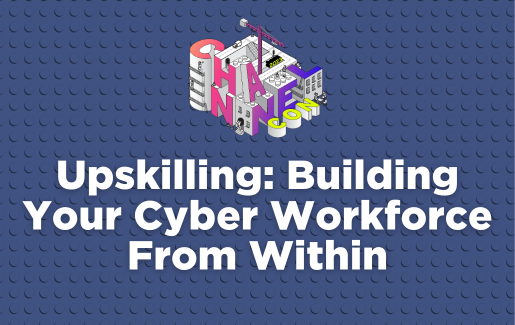 In today’s modern world where technology is at the forefront of all that we do, the demand for cybersecurity professionals is high, and ever increasing. But for any organization, hiring people with the right cybersecurity skills can be a challenge. So, why not look within and upskill current employees with existing institutional knowledge with the skills and competencies needed to fill your open cyber roles?
In today’s modern world where technology is at the forefront of all that we do, the demand for cybersecurity professionals is high, and ever increasing. But for any organization, hiring people with the right cybersecurity skills can be a challenge. So, why not look within and upskill current employees with existing institutional knowledge with the skills and competencies needed to fill your open cyber roles?
During a panel discussion at ChannelCon 2023, a group of industry thought leaders dove into how you can grow your cybersecurity workforce through upskilling, the importance of hiring the right people and why investing in your employees is so important. Here’s what they had to say.
Hiring For Cultural Fit
When it comes to hiring, something all of the panelists agreed on is that you can’t just pull anyone off the street and expect them to be a good culture fit for your organization. However, finding someone that is the right fit requires you to have a solid definition of what culture means to you and your employees before you even look to external candidates to fill new roles.
“[Our values] are a part of who we are, and our staff helped to develop them. And they helped us to have a much clearer view of what we want [in a candidate],” said Dave Alton, chief technology officer, Strategic Information Resources, Inc.
Ensuring that your employees know what your values are, have a hand in creating them and bringing them to life is so important, Alton said.
“It’s one of those things where especially during the hiring process where the candidate is potentially going to interview with several people, if you are all aligned on what’s important to the organization and the personality you’re looking for [in a new hire], it helps so much,” said Hannah Johnson, senior vice president, tech talent programs, CompTIA. “Having defined values is a nice guiding framework or rubric for any hiring process.”
It Starts With Hiring the Right People
“One of the topics that we all agree on is that in order to upskill to create opportunities for more cyber talent, you have to have the right employees in place. So, in order to do so, you want to make sure that these employees are ones that you want to invest in and also want to invest their time in you,” Johnson said.
For any sized business, hiring is an expense that you don’t want to have to keep paying over and over again due to high attrition rates. And while figuring out what works for you might take some trial and error, it is worth it to curate a strong team that echoes your values and is willing to invest in your business just as much as you’re willing to invest in them.
“I learned from a lot of trial and error,” said Alex Spigel, chief operating officer and co-founder, Choice Cyber Solutions. “When we would go to Indeed or LinkedIn Jobs, we were just picking up the phone and calling people, wasting so much time going through like thirty different resumes and making calls. So now we have a questionnaire that gauges their communication skills, but it also asks questions like, what do our core values mean to you? And what does attitude mean to you in the workplace?”
Asking questions like these, as well as requiring candidates to complete short technical exams, ensure that they can not only execute on the skills they claim to have, but also shows that they are eager, Spigel explained.
While company culture should be an important factor in any hiring process, you still need to ensure that the person you hire has the skills necessary to effectively perform in a cybersecurity role.
Many organizations over-emphasize the importance of academic degrees for IT or cybersecurity job candidates, but in reality, these sorts of credentials don’t always mean that their knowledge translates to real world scenarios.
“One of the things I’m focused on is skills versus school. We need to interview for skills and stop using the proxy of a degree to measure skills. It is a bad measure and doesn’t result in positive outcomes,” said Gordon Pelosse, senior vice president, employer engagement, CompTIA.
Upskilling to Fill Cyber Roles
Defining your values and hiring the right people are both great entry points to successfully deploying upskilling strategies, Johnson said.
“We decided we wanted to do an apprenticeship program. And as a small company of only about twenty people, we thought that it was going to be a lot of work and very difficult. But what we found was the exact opposite,” Alton said. “It supercharged our business and we have gone from not having any [documented] values to having a set of values, a mission statement and our employees are onboard, engaged and we have received more customer thank-yous than we’ve ever seen. And it’s all because we chose to say, ‘hey, we want to do this for others.’ Ultimately it has made a huge difference and it’s way easier than anybody believes.”
And while an apprenticeship program might work for some, upskilling doesn’t always require a formal program in order for it to be effective. Investing in your employees can be as simple as sitting down with them on a regular basis to understand their goals and make plans to help them get there, whether it be through mentorship, certifications or other means.
But as a small- to medium-sized business, there is also a fear that comes along with upskilling your employees. When you provide them with knowledge and access to certification and training that can help them progress in their careers, there is always the chance that they will leave your company to utilize their new skills elsewhere.
“A part of the big fear we had was that when you get someone certified, they have this skill, have this knowledge and then they leave. So, we had them sign a contract saying, ‘yes I’m going to do this, but if I leave within a certain timeframe, I’ll pay you back for what I’ve learned.’ In that contract it also says that they have to share the information they learned with others,” said Eric Torres vice president, channel, ScalePad. “And that built not just that person, but everyone on staff.”
When organizations realize that the person they hired can do more than just the initial job that they were hired for, it can be a win-win for everybody, Johnson said.
When you provide your employees with the opportunity to grow and you invest in them, it makes them that much more inclined to invest back into your business.

 Add CompTIA to your favorite RSS reader
Add CompTIA to your favorite RSS reader
.png?sfvrsn=1f6b5713_2)
